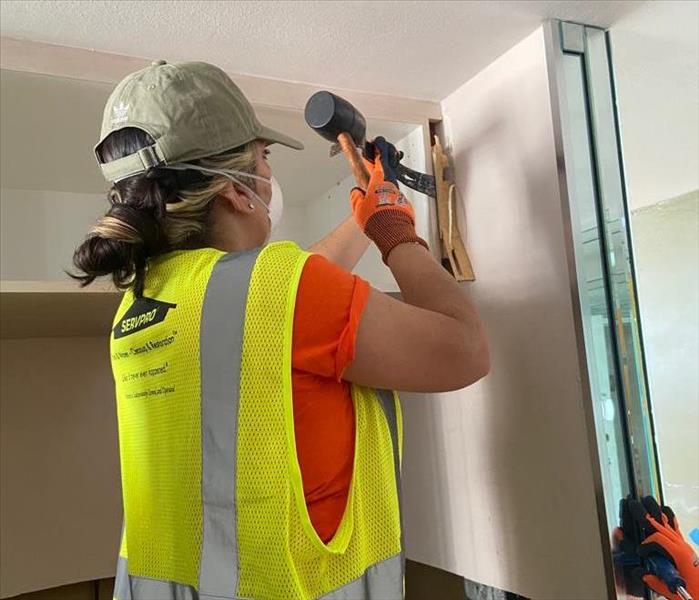Renovation Red Flags: Signs of Potential Mold Issues During a Remodel
11/9/2024 (Permalink)
 Renovating your home is a big project, and the last thing you want is a mold problem to slow you down.
Renovating your home is a big project, and the last thing you want is a mold problem to slow you down.
When you're renovating your home, the last thing you want is an unexpected mold problem. Mold can hide behind walls, under floors, and in ceilings, leading to expensive delays and repairs if not caught early. At SERVPRO®, we know how important it is to spot these red flags before they become serious issues. In this blog, we'll walk you through the key signs of potential mold problems during a remodel and how to prevent them.
Signs of Potential Mold Issues During Renovation
As you start knocking down walls or pulling up flooring, it's important to stay alert for these warning signs of mold:
- Visible Discoloration on Surfaces
One of the easiest ways to spot mold is by looking for discoloration. Mold can appear as black, green, or white spots on drywall, wood, or tile. If you see these stains—especially in areas that have been exposed to moisture, like under sinks or behind shower walls—it’s a clear sign mold could be present.
- Musty Odor
If you notice a persistent, musty smell during your renovation, that's another sign mold might be hiding nearby. Mold can thrive behind walls or under floors, so even if you don’t see it right away, a musty odor could indicate it's lurking somewhere out of sight.
- Previous Water Damage
If your home has had water damage in the past, whether from leaks, floods, or humidity, there’s a good chance mold could have developed. According to the U.S. Environmental Protection Agency (EPA), mold can start growing within 24 to 48 hours after water exposure. During your remodel, be sure to check any areas where water damage occurred for mold growth.
Common Areas to Check for Mold During a Remodel
Certain areas of your home are more prone to mold than others. If you’re remodeling, be sure to give these spots extra attention:
- Bathrooms and Kitchens: These rooms see a lot of moisture, which makes them prime locations for mold. Check behind walls, under sinks, and around plumbing for any signs of trouble.
- Basements and Crawl Spaces: These areas tend to be damp and poorly ventilated, which encourages mold growth. Inspect walls, floors, and spaces near water heaters or sump pumps for mold during your renovation.
- Attics: Poor ventilation in attics can lead to trapped moisture, so make sure to check insulation, rafters, and the roof during your remodel for any signs of mold.
Preventing Mold During Renovation
It’s not enough just to recognize the signs of mold—you’ll want to take steps to prevent mold from forming during your remodel. Here are some easy ways to keep mold at bay:
- Fix Leaks Right Away: Whether it's a dripping faucet or a roof leak, taking care of water issues promptly is the best way to stop mold from taking root.
- Improve Ventilation: Proper airflow is key to keeping moisture levels down. Make sure your bathrooms, kitchens, and laundry areas are well-ventilated to avoid mold growth.
- Use Mold-Resistant Materials: If your renovation involves replacing drywall, insulation, or other materials, opt for mold-resistant products to reduce the risk of future mold problems.
When to Call a Professional
If you find a significant amount of mold during your remodel, it’s time to call in the professionals. SERVPRO of Downtown Memphis specializes in mold remediation and can safely remove any mold issues, ensuring your renovation stays on track. Trying to handle mold on your own could lead to further damage or contamination, so it’s best to leave it to the experts.
Keeping Your Remodel Mold-Free
Renovating your home is a big project, and the last thing you want is a mold problem to slow you down. By staying alert for signs of mold and taking preventative steps, you can avoid expensive issues. And if you do spot mold, our SERVPRO team is here to help with professional mold remediation services. We’ll make sure your renovation stays on track and your home stays mold-free.

 24/7 Emergency Service
24/7 Emergency Service